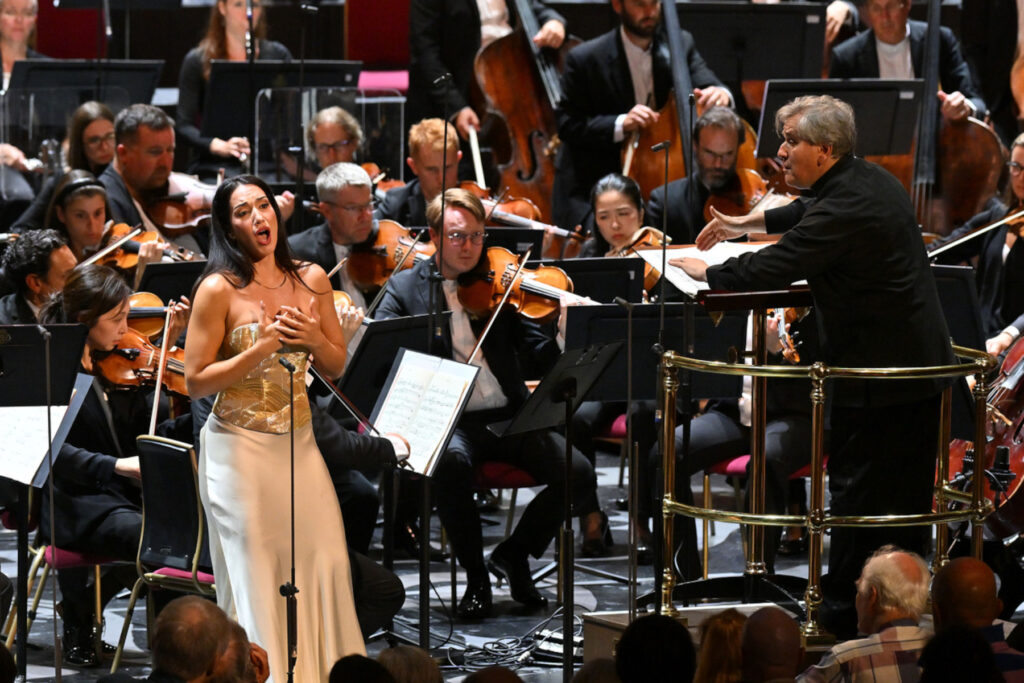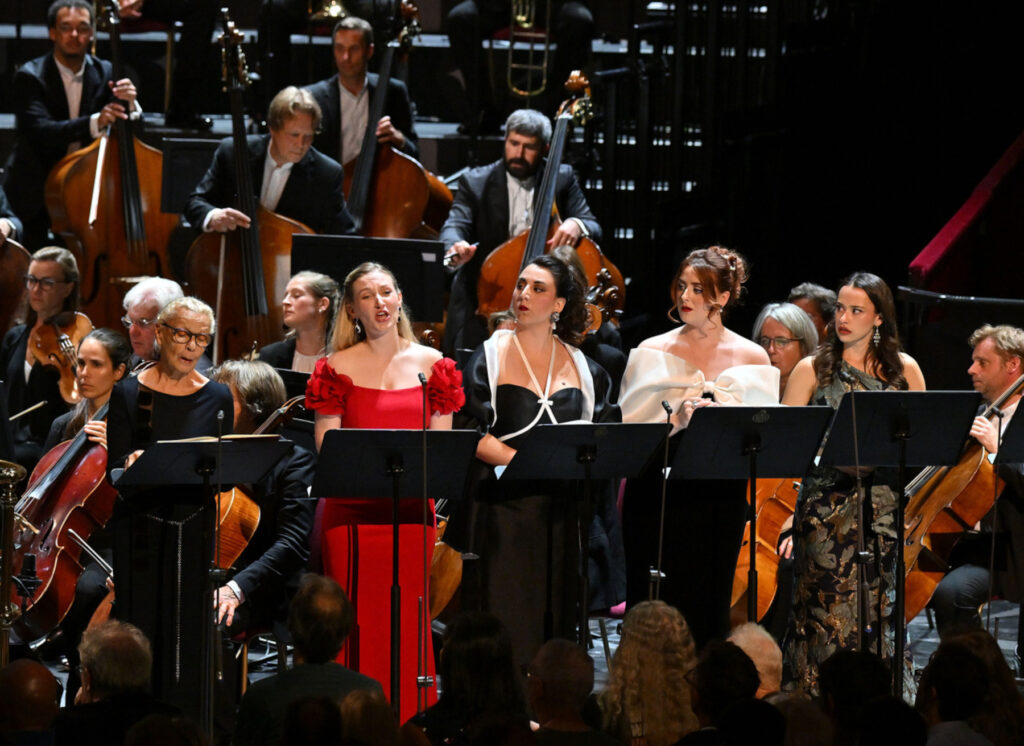It used to be a fairly rare treat to hear Suor Angelica, but of late there have been a number of significant stagings. Strauss’s Die Frau ohne Schatten is rarer still, at least on these shores; putting the two together was inspired. They intersect via dates of composition: Die Frau, the opera, was premiered in 1919; Suor in 1918. The dates are perhaps significant; to borrow from a memorable musicological article on Ives and Mahler in the journal Nineteenth-Century Music (‘Ives and Mahler: Mutual Responses at the end of an Era,’ Robert P. Morgan, Vol 2/1, 1978) what we have here is Strauss and Puccini: mutual responses at the tail-end of a world war.
Strauss’s Die Frau ohne Schatten (The Woman without a Shadow) is an opera of staggeringly allegorical plot. Strauss made a ‘Symphonic Fantasy’ in 1946 (Leinsdorf, incidentally, also prepared a ‘Suite’ which he recorded with the Philharmonia Orchestra in positively incendiary form). We learned above that Strauss’s opera was premiered in 1919; the composer made his ‘symphonic fantasy’ in 1946, a product therefore of his Indian Summer. He is hardly the first composer to look back over such a stretch of time (Schoenberg left a gap of seven years between parts of Gurrelieder’; those years just happened to be a stretch where he changed the course of music itself). One does wonder how difficult this is, though, to put one’s mind into reverse.

Die Frau ohne Schatten is often compared with Mozart’s Zauberflöte; both are certainly fantastical. Strauss couches the story, musically, in his own opulent vernacular. But there was bite in Pappano’s performance, too, right from the brass at the opening, demanding our attention. But at the heart of Pappano’s account was aching lyricism and, within that, other contrasts, contrasts of character. The Emperor’s music at the opening and its contrast to the Nurse’s, for example. It is true, as the programme notes say, that ‘for the most part, the music is thickly scored’; from an objective look at the score perhaps. But listen to Pappano’s revelatory performance, and that would be hard to credit. Detail came though at every point; nothing (astonishingly, given that this is the Albert Hall) blurred. Textures were translucent, glowing, horns swashbuckling. The overall impression was light, but, oh so Straussian. Sudden dance rhythms were wonderful. The LSO played at their finest standard, woodwind flitting, sometimes angular strings arching phases, and there was a particularly nice moment from tuba player Ben Thomson.
Pappano shaped the work beautifully so the final moments had great impact, guest leader Benjamin Marquise Gilmore’s violin adding a sweet ascent, brass and wind perfectly calibrated and secure. While many will know the fantasy, if at all, via JoAnn Falletta’s Naxos account with the Buffalo Philharmonic, this is in a completely different league. This was a great coupling, the Strauss climaxes leaving an indelible effect; I mention this as a few days ago (the 16th), the same forces performed Suor Angelica in Edinburgh, but with Puccini’s Capriccio Sinfonico and Victor de Sabata’s Juventus. Interesting fare; but this was the real deal.

And so, to the heart-wrenching Suor Angelica. This is a complex opera with a fairly large cast, but you do need two things as a basis: a great Puccini conductor, and a great soprano for Angelica. Luckily, this had both: Pappano is not consistently excellent, but his Romantic Italian repertoire has never disappointed. With the London Symphony Chorus in tremendous form (a great opening ‘Ave Maria’), everything was set. Rarely have the opening bells sounded so right; and how Pappano can elicit true pianissimi from his forces. Just as the Strauss was well-placed in terms of orchestral sound, the LSO transforming themselves into an Austro-Germanic ensemble, now suddenly they could have come from an Italian opera house. Textures lightened, as if light shone through a stained-glass window. All with an undercurrent of the tragedy that is to unfold: Pappano has his ear on the larger scale. As the opera continues, the music focuses more and more on Angelica. With the central confrontation with her Aunt, Princess Kseniia Nikolaieva, the music reaches its emotional climax; and the fall-out is extraordinary.
It is true the evening absolutely belonged, vocally, to the Angelica of the Bolivian-Albanian soprano Carolina López Moreno (one of eight singers making their Proms debut). Her voice is so perfect for Puccini; it is no surprise to learn she goes on to sing the title role in Manon Lescaut at Cologne under Andrés Orozco-Estrada in late September. The lower end of her voice has strength, the upper steel, yet she can be so vulnerable and so touching (‘To offerto la vergine’ leading, of course, to the astonishing ‘Senza mamma’). When it came to the closing moments (‘Ah! Son donata’), she had channeled Puccini’s wishes effectively; the hall was awash with emotion.
The Princess’s role was taken by Ukrainian mezzo Ksenia Nikolaieva (who in her career moved from the Ukrainian National Tchaikovsky Academy to the National Opera Studio here). In a rather nice synchronicity, she has previously sung the Voice from Above in Strauss’s Die Frau ohne Schatten (with the Berliner Philharmoniker in Baden-Baden). She has a truly deep, imposing mezzo; just right for this role, of course. Authoritative in extremis and with a voice that loses precisely zero tone as it goes higher, she is a force of nature; under any other circumstances, she would surely be the stand-out. The scene between Angelica and the Princess was held together by some of Puccini’s darkest moments; Pappano ensured a sort of dark radiance from his orchestra.
Both Sarah Dufresne (Sister Genovieffa) and Kaite Lowe (Nurse Sister) seem to impress more on every occasion: one remembers Lowe as Freia, Rheingold, ENO, and Dufresne as Frasquita Carmen, Covent Garden, to name but two. Both impressed here, Dufresne’s ‘O Sorelle, sorelle’ properly impassioned. Good to have experience in the cast, too: Elena Zilio (who debuted in 1963 at the Spoletta Festival as Sofia, Rossini Il Signor Bruschino) as Monitress, with enough stage presence to fill several Albert Halls. Mezzo Angela Schisano was another strong singer (as Mistress of the Novices).
It is fair to say that there was no weak link here in his cast. The mix of experience and the crème de la crème of young Puccini talent was perfect; even then, the whole was greater than the sum of the parts.
This was, incidentally, the first Proms performance of Suor Angelica (the remaining operas of Trittico have been heard before). What a way to start.
Colin Clarke
Pappano Conducts Puccini and Strauss (BBC Proms 2025)
Die Frau ohne Schatten – Symphonic Fantasy
Composed by Richard Strauss
Suor Angelica
Composed by Giacomo Puccini
Libretto by Giovacchino Forzano
Cast:
Suor Angelica – Carolina López Moreno; Princess – Ksenia Nikolaieva; Sister Genovieffa – Sarah Dufresne; Monitress – Elena Zilio; Mistress of the Novices – Angela Schisano; Abbess – Monika-Evelin Liv; Nurse Sister – Katie Lowe; Alms Sisters – Jenny Safford; Caroline Bourg; Sister Dolcina – Hayley Meth; First Postulant/First Novice – Manon Ogwen Parry; Second Postulant – Julia Solomon
Tiffin Boys’ Choir; London Symphony Chorus & Orchestra / Sir Antonio Pappano
Royal Albert Hall, 19 August 2025
All photos © Mark Allan